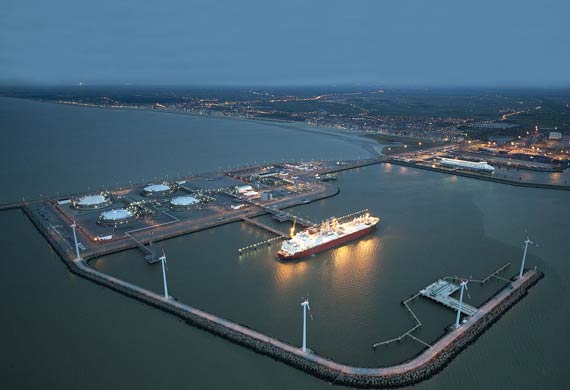
Zeebrugge Europe’s food logistics crossroads
Port of Zebrugge enjoys a leading edge over other sea ports in offering a variety of services in food logistics by adopting innovative techniques. Michael Sales… Looking at the map of the Northern European coast from Hamburg to Le Havre, there are a variety of sea ports large and small, each providing a range of specialised […]

Port of Zebrugge enjoys a leading edge over other sea ports in offering a variety of services in food logistics by adopting innovative techniques. Michael Sales…
Looking at the map of the Northern European coast from Hamburg to Le Havre, there are a variety of sea ports large and small, each providing a range of specialised facilities. It would however be hard to find another port with such a diversity of services and special features as Zeebrugge. Strategically positioned, the port, with its wide range of port facilities, connects around 250 million European consumers, within 700 kilometres, with the rest of the world. The port’s 45 million tonnes of annual cargo, is a mix of containers,-2 million TEUs, liquefied gas, bulk shipments, new vehicles, especially cars, agricultural produce and fruits. Inaugurated in 1905, Zeebrugge has recently become the fastest growing port on the North European coast.
Thanks to the lack of congestion, the port provides rapid transit of cargo to its inland destinations. Close to the European motorway network, most of the leading urban conurbations such as the Ruhr district in Germany or the Isle De France Paris region in France, are only some five hours away. Many leading container shipping companies service the Middle East and Far East from Zeebrugge, with dedicated terminals operated by PSA and APM. The port’s activities focus strongly on the British and Chinese markets especially for vehicles. Ro-Ro services between Britain as well as the Baltic region are used by Peugeot and Citroen cars coming from France bound for the UK and Honda cars arriving from Mexico destined for various European markets.
Food traffic, an important sector
The port has a long and successful tradition in handling and storage of food and perishable products and has for several years hosted the Cool Logistics conference, a leading event in the perishables shipping calendar. The ability to handle these products rapidly is essential for the shippers in such a highly competitive field as food and facilities must keep abreast of innovative techniques through a continued investment policy.
For example there are three deep sea container terminals with a total of 1,200 reefer plugs, the Belgian New Fruit Wharf, a Sea-Invest subsidiary, offers 60 000 m² ofcold storage for 25.000 pallets of exotic or deciduous fruit and vegetables. The facility is also equipped to handle containers and is fully controlled by WMS with real-time barcode scanning. Zeebrugge has been Europe’s main entry point for Zespri kiwifruit from New Zealand since 1984. Annual volumes amount to100 000 tonnes.ICO, a joint-venture between ICO and RhenusHolding, offers specialised facilities for the storage and packaging of potatoes and sugar. Imports come from the Caribbean, South America, New Zealand, and the Mediterranean with frequent exports to Saint Petersburg in Russia.
The Border Inspection Post, which houses veterinary inspection and customs offices, is located within a two kilometre radius of the container terminals and cold storage warehouses. This results in considerable time-saving and lower transport costs to get cargo cleared and released. In order to succeed in the on-going contest between ocean and air to deliver perishable products, ocean perishable operators need to benefit from every technical advance, which this port is tackling on an on-going basis.
This mix of traffic streams fit well with the access to profitable markets and has enabled Zeebrugge to develop so successfully. Investment opportunities are offered for companies wishing to develop business within the port. Some 120 hectares of land with 25 year lease potential are currently available.
The 7th Cool Logistics Global Conference, takes place for the first time inSeptember in Bruges and attracts some of the leading companies and top speakers in the industry. Its close association with the Port of Zeebrugge clearly fits with the importance of this sector. Key speakers come from Rabobank, the UK Overseas Development Institute, MearskLine, CMA CGM, Lufthansa Cargo, Kuehne and Nagel, AT&T, Floraholland, OOCL and many more and the conference will be chaired by Joachim Coens, head of the port of Zeebrugge. The wide ranging conference subjects include amongst others - trade trends, the role of ports, supply chain risk, emerging markets, ocean freight debate, modal shift, airfreight, climate change, technology and climate change.
“Our conference concentrates on the vital factors for helping global food production as well as the combined transport and logistics sector to revisit and improve the deployment of capacity and technology along the perishable supply chain,” says Alex von Stempel, Managing Director, Cool Logistics Resources.
The event is attracting much interest from the fast growing perishable and pharmaceutical sector and promises once again to be a great success for the conference and for its host , the Port of Zeebrugge.

